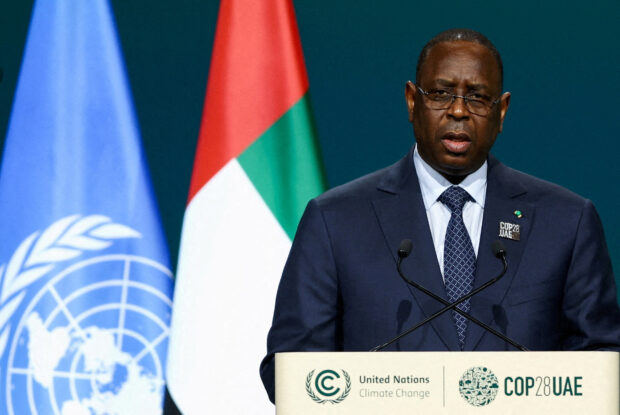
FILE PHOTO: President of Senegal Macky Sall delivers a national statement at the World Climate Action Summit during the United Nations Climate Change Conference (COP28) in Dubai, United Arab Emirates, December 1, 2023. REUTERS/Amr Alfiky/File Photo
Dakar, Senegal — Senegal on Thursday looked set to elect its new president on March 24 and end weeks of crisis triggered by the delay to the poll, after the top constitutional body agreed to the new date suggested by the president.
Confusion had reigned late Wednesday after President Macky Sall set March 24 as the date for the postponed election, while Senegal’s Constitutional Council said it should take place on March 31.
On Thursday, the council said that it had merely “compensated for the inertia of the administration” by announcing a March 31 election date, but suggested that in the meantime the executive had remedied the situation by calling the election for March 24.
READ: Senegal police quash protests as opposition rejects election delay
Sall plunged Senegal into one of its worst crises in decades with his last-minute postponement of the presidential poll, originally scheduled for February 25.
The vote delay sparked an outcry at home and abroad and unleashed protests which left four people dead.
The traditionally stable West African nation is now re-embarking on what is perhaps its most open presidential vote in modern history.
There have been some potentially significant developments in the meantime.
The adoption of a controversial amnesty law late Wednesday could see anti-establishment opposition candidate Bassirou Diomaye Faye released from prison to campaign.
The first-round vote will now take place before Sall’s mandate ends on April 2, which was one of the key drivers of the turmoil.
The date of the second round has not been announced.
‘Breathe again’
Some residents in the capital Dakar expressed relief at having some election clarity after weeks of uncertainty.
“The students and everyone else were in a rather anxious and stressful situation,” said student Mamadou Drame.
“At last Senegal will be able to breathe again.”
“We (had) the impression that the country (had) stopped turning,” said a rapper who goes by the name of Xuman.
“In less than three weeks we’ll be going to the polls. I think it’s high time we tried to turn the page and move on,” he added.
READ: Student becomes first death in growing Senegal election protests
Holding the election on March 24 will avoid it coinciding with Easter Sunday, which would affect Senegal’s significant Christian community.
But campaigning will now take place during the Muslim fasting month of Ramadan.
The campaign period will also be shorter than the 21 days prescribed by Senegal’s electoral code.
“All that is part of a normal situation, but here we are in an exceptional situation,” said Babacar Gueye, one of the leaders of a major civil society collective opposed to the election delay.
The new timetable “is the victory of all the people who wanted to go to an election of which they were deprived,” he added.
Amnesty
Sall had on Monday asked the Constitutional Council for its opinion on recommendations resulting from a “national dialogue” which he had convened to try and find a way out of the turmoil.
The dialogue had recommended elections be held on June 2 and suggested Sall remain in office until his successor was installed.
The council on Wednesday rejected this proposal and another which had suggested the candidate list be re-examined.
Sall, in power since 2012, said he called off the vote due to disputes over the disqualification of potential candidates and fears of a return to the unrest seen in 2021 and 2023.
In a bid to escape the crisis and calm public opinion, Sall had proposed a bill granting an amnesty for acts committed in connection with political demonstrations since 2021.
Lawmakers late Wednesday adopted the law.
Senegal witnessed several episodes of deadly unrest triggered in particular by a bitter stand-off between now-imprisoned opposition figure Ousmane Sonko and the state.
His party’s deputy, Bassirou Diomaye Faye is also in prison but has been approved to stand in the presidential race.
Both could be eligible for release following the adoption of the amnesty law but there has been no indication as to whether or when this would happen.

